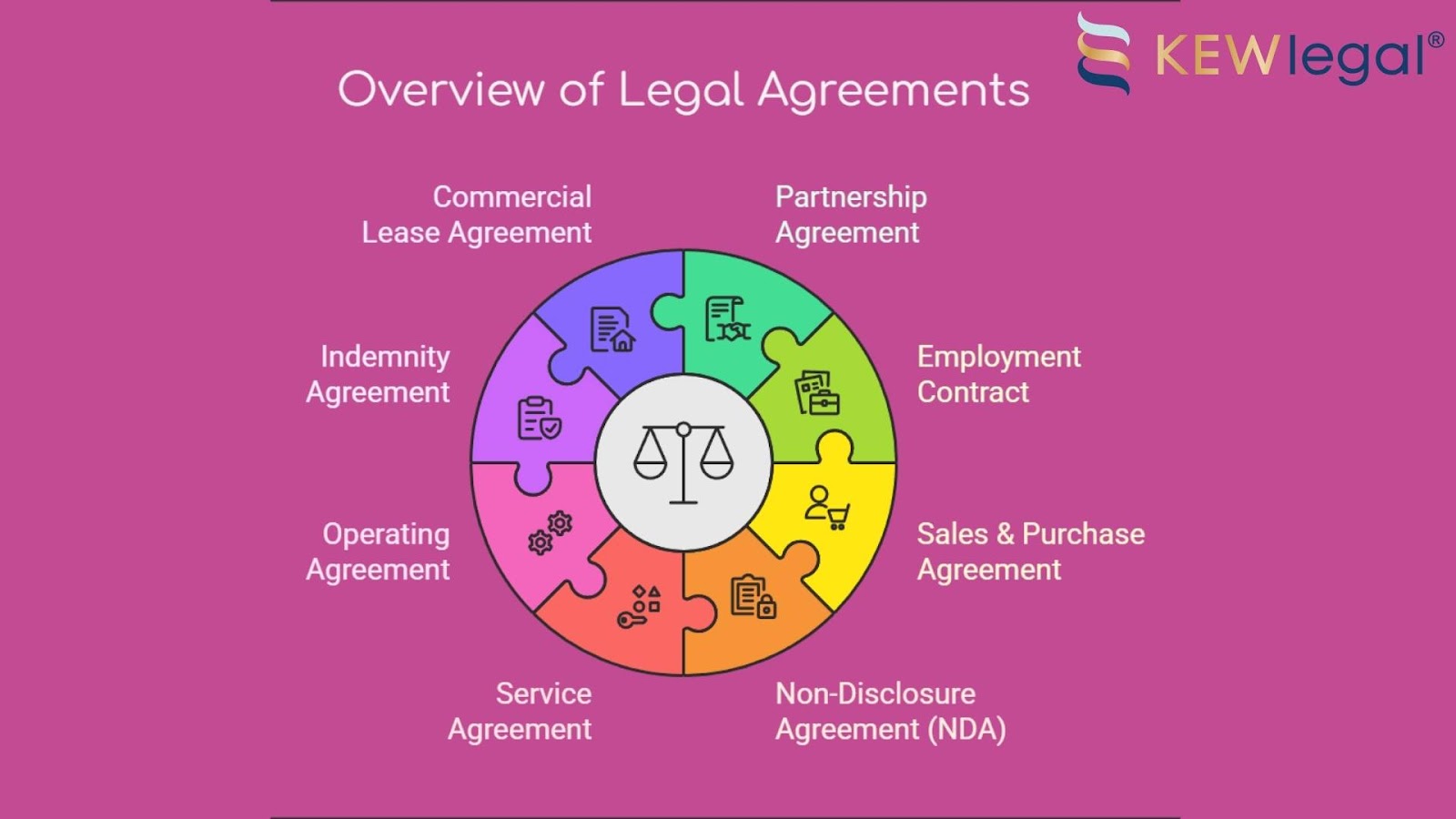Business owners frequently use contracts as tools to formalize agreements and protect their interests. Depending on their business needs, owners may rely on various types of contracts to establish clear terms with employees, vendors, and clients.
According to B2B Reviews, 40% of a contract’s value can disappear due to inefficiencies or mismanagement. By understanding the different types of contracts, you can better protect your business and increase the value of your agreements.
At KEW Legal, we help create clear, practical contracts that protect your interests without wasting time or money. With deep experience in business and real estate law, we make sure you understand exactly what you’re signing and why it matters.
Key Takeaways
- Clear contracts prevent disputes, define responsibilities, and protect assets.
- Well-managed contracts reduce risks, improve efficiency, and strengthen relationships.
- Customized agreements like commercial leases of employee contracts, made with the assistance of legal professionals, prevent misunderstandings and protect business operations.

1. Partnership Agreement
A partnership agreement outlines how your business operates, who does what, and how profits and losses get divided. Having this agreement in place reduces conflicts between the involved parties.
A partnership agreement clearly outlines:
- Profit-sharing structure
- Roles and responsibilities
- Decision-making processes
- Exit or buyout terms
When You Need One
Always draft a partnership agreement when starting or joining a business partnership to prevent disputes and clarify expectations from the outset. Without this agreement, businesses risk internal conflict, unclear responsibilities, and costly legal battles when partners disagree or separate.
2. Employment Contracts
An employment contract clearly lays out the terms between employers and employees, preventing conflicts about job expectations and payment details. Employment contract disputes in Florida have increased significantly over the last few years. Clearly written contracts can help your business avoid becoming a part of this rising trend.
What Every Employment Contract Should Include
A clear employment contract provides straightforward coverage of these points:
- Job responsibilities: Clear description of tasks expected from the employee.
- Compensation details: Salary, benefits, bonuses, and payment schedules.
- Confidentiality clauses: Protect your business’s private information.
- Termination terms: Clear guidelines for contract termination or renewal.
Relying on verbal agreements, generic online templates, or not consulting a lawyer can cause expensive misunderstandings later.
3. Sales and Purchase Agreements
Sales agreements focus on the seller’s commitment to deliver goods or services, while purchase agreements outline the buyer’s intent to acquire assets, often with conditions attached. These agreements make sure that both buyers and sellers understand their obligations.
What Every Sales and Purchase Agreement Needs
Custom, well-structured contracts help make for smooth transactions, prevent legal issues, and protect business interests. Using vague terms, failing to specify conditions, or relying on verbal agreements can lead to costly disputes.
These key elements should be included:
Sales Agreements:
- Product or service details: Clear specifications on what is being sold.
- Pricing and payment terms: Agreed-upon cost, payment schedules, and penalties for late payment.
- Delivery and acceptance terms: Conditions for transferring goods or services to the buyer.
- Warranties and liability: Seller’s guarantees regarding product quality and performance.
Purchase Agreements:
- Buyer’s obligations: Details on financing, inspections, or approvals needed before finalizing the purchase.
- Contingencies: Conditions that must be met before the purchase is completed.
- Closing terms: The final steps required to complete the transaction and transfer ownership.
4. Non-Disclosure Agreements (NDAs)
A non-disclosure agreement, often called an NDA, is a document that helps keep sensitive information private. It makes sure anyone you share your business secrets with, like employees, contractors, or suppliers, won’t pass that information to others. It also states the repercussions of when an NDA is not followed.
When to Use an NDA
You might consider an NDA when:
- Hiring freelancers or contractors who’ll see your internal processes
- Talking with potential business partners about new opportunities
- Sharing financial data or strategies with investors
- Discussing new product ideas with manufacturers or suppliers
Mistakes to Avoid With NDAs
While NDAs are simple, there are common mistakes you should avoid:
- Being too vague: Clearly state what’s confidential so everyone understands.
- Skipping the time frame: Always include how long the information must remain private.
- Not specifying penalties: Mention what happens if someone breaks the agreement.
5. Service Agreements
A service agreement clearly describes the services you’ll provide to a client, what they’ll pay, and how you’ll handle any issues along the way. It’s your roadmap for smooth business relationships, helping you avoid misunderstandings and stay on good terms with your clients.
What Should a Service Agreement Include?
An effective service agreement covers:
- Detailed description of services: Clearly explains what is and what isn’t included.
- Pricing and Payment Terms: States exactly how much clients will pay and when payments are due.
- Timeline and Deadlines: Makes sure both parties know when services will be completed.
- Dispute Resolution: Defines how disagreements will be resolved.
Common Pitfalls to Avoid
To protect your business from awkward situations and disputes, avoid these mistakes:
- Skipping details: Never assume the client knows what you mean. Be sure to spell it out.
- Not setting boundaries: Clearly state what’s out-of-scope to prevent requests for unpaid extras.
- Ignoring cancellation policies: Clearly outline terms for ending the agreement to prevent financial losses.
6. Operating Agreements
Operating agreements set clear guidelines for managing an LLC, including decision-making processes, roles, and profit sharing. LLCs remain one of Florida’s most popular business structures. With so many LLCs forming each year, operating agreements are an important tool to protect companies from internal disputes.
Why It is Important for LLCs
Even though some states don’t legally require operating agreements, having one is still a smart move. Without clear rules, small misunderstandings between members can grow into big conflicts that drain your time, money, and energy.
A solid operating agreement should always include:
- Ownership details: Clearly explain each member’s ownership percentage.
- Roles and Responsibilities: Define who handles daily operations, finances, and big decisions.
- Voting rights: Clarify how decisions are made, such as majority vote, unanimous agreement, or another method.
- Exit and Buyout Plans: Outline what happens if someone wants out or passes away, allowing the business to remain stable.
What Can Happen Without an Operating Agreement
Running your LLC without a clear agreement can cause unpredictable issues. Partners can end up confused about their roles, conflicts can escalate quickly, and resolving disputes can get expensive and stressful. It’s better and cheaper to set clear guidelines from the start.
7. Indemnity Agreements
An indemnity agreement protects your business from being responsible for mistakes made by others working with you. Overly broad indemnity agreements are often thrown out by Florida courts, showing the importance of precise terms.
When You’ll Need an Indemnity Agreement
Common situations where you’ll need an indemnity agreement include:
- Hiring subcontractors or freelancers who could cause accidents or errors.
- Leasing your business property to tenants who might damage it.
- Partnering with other companies on projects involving financial risks.
Having this type of agreement means you won’t be stuck paying for someone else’s mistakes or negligence.
8. Commercial Lease Agreements
Commercial leases define rental terms clearly, specifying your rights and responsibilities for rented business property. According to the Commercial Observer, commercial spaces in cities like Miami-Dade never have vacancy rates higher than 5%, indicating high demand.
A well written lease protects your interests and prevents costly disputes in a competitive rental market.
Key Elements to Include in a Lease Agreement
Understanding commercial leases can protect your money and your peace of mind. Always pay attention to these details:
- Rent and payment schedule: Clearly state the exact monthly rent, due dates, and possible penalties.
- Lease duration: Relay how long someone is committed to the property and when they can renew or exit.
- Who handles repairs: Avoid arguments by defining who’s responsible for fixing broken equipment or property issues.
- Renewal terms: Specify what happens when the lease term ends. Provide details on renewals and rental increases
Get Your Business Agreements Sorted Without the Stress

Strong business agreements don’t have to be complicated. At KEW Legal, we focus on clear, practical legal solutions that protect your company and save you time and money. If you’re ready to set your business up for success with straightforward, client-focused guidance, our team is here to help.
For contracts you can understand and rely on, head over to our contact page and connect with us today.

